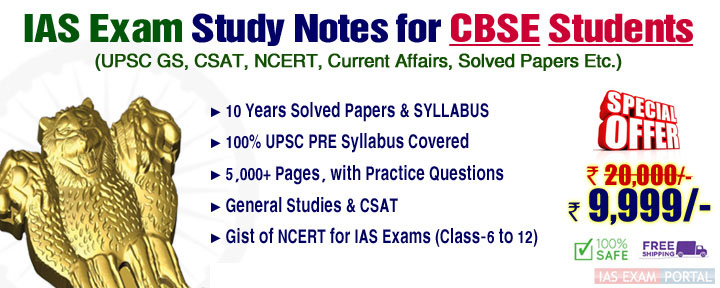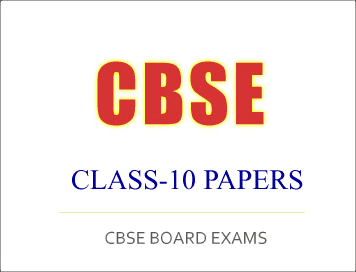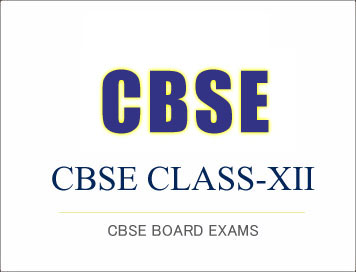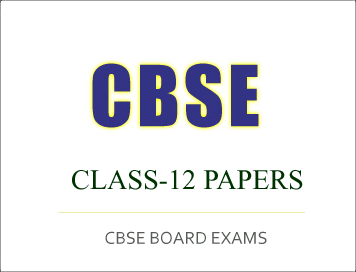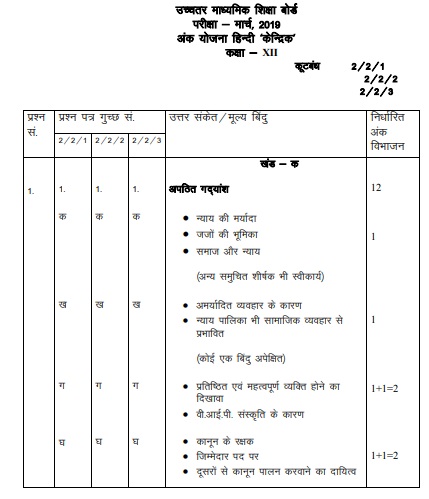CBSE PORTAL : “IAS Exam Foundation Study Notes for CBSE Students” plus 5 more |  |
- IAS Exam Foundation Study Notes for CBSE Students
- (Download) CBSE Class-10 Sample Paper And Marking Scheme 2019-20: Information Technology
- (Download) CBSE Class-12 Sample Paper 2019-20 : Shorthand
- CBSE Class-10 Exam 2019 : Marking Scheme, Science
- CBSE Class-12 Exam 2019 : Marking Scheme, Hindi Core
- (Download) NCERT Book For Class XI : Health Care (Vision Technician)
| IAS Exam Foundation Study Notes for CBSE Students Posted: 08 Jan 2020 05:05 AM PST
IAS Exam Foundation Study Notes for CBSE Students |
| (Download) CBSE Class-10 Sample Paper And Marking Scheme 2019-20: Information Technology Posted: 08 Jan 2020 03:18 AM PST |
| (Download) CBSE Class-12 Sample Paper 2019-20 : Shorthand Posted: 08 Jan 2020 03:18 AM PST
(Download) CBSE Class-12 Sample Paper 2019-20 : ShorthandClass: XII SECTION - AAttempt any 10 Questions out of the following. Each question carries one mark: (10X1) =10 Fill in the Blanks with suitable words in the following questions: 1. Diphone signs are placed on ___________ places of a Consonant. 2. Prefix ‘Self’ is represented by a_____________ circle to be written close to the following stroke in the second vowel place. 3. Contractions are generally written __________ the line. 4. Doubling Principle is used in forming Advanced Phrases for the words_______. 5. Stroke ‘S’ is employed to represent the word _________ in forming Intersections. Answer the following questions in not more than 25 words each: 6. Explain by giving suitable examples the rules for writing Consonant ‘L’ in downward direction. 7. How is the Prefix ‘Magna/Magni/Magne’ represented in Shorthand? 8. Define General Contractions. 9. Explain with examples the use of ‘N hook’ in forming Advanced Phrases. 10. Which words are represented by Downward ‘R’ in forming Intersections? Explain by giving suitable examples in Shorthand. 11. Explain the use of Halving Principle in forming Advanced Phrases. Write suitable Shorthand examples. 12. How are the following Suffixes represented in Shorthand?
SECTION - AAttempt any 5 Questions out of the following in not more than 50 words each. Each question carries 3 marks: (5X3) =15 13. How many Diphones are there in Pitman Shorthand and how are they represented? 14. Write any six Shorthand Outlines by using Suffixes ‘Ship’ and ‘Meant’. 15. Explain by giving suitable examples in Shorthand the omission of consonant ‘N’ in forming General Contractions. 16. How are the Special Contractions formed by intersecting Consonants? Give suitable examples in Shorthand. 17. How Consonant ‘SH’ is written before Consonants ‘F’, ‘V’, ‘TH’, ‘KR’, ‘GR’, ‘KL’, ‘GL’, ‘FR’, ‘VR’, ‘MR’ and ‘L’? Give suitable examples in Shorthand. 18. Write any six words (Intersections) in Shorthand by intersecting Consonants ‘P’ and Downward ‘K’. 19. Define Intersections. Write any four Intersections in Shorthand. SECTION - BAttempt any 1 Question out of the following in not more than 150 words each. Each question carries 5 marks: (5X1) = 5 20. Describe in detail the rules of representing Suffixes and Terminations in Shorthand. 21. How are the Advanced Phrases formed in Shorthand? Explain the rules by giving suitable Shorthand examples. |
| CBSE Class-10 Exam 2019 : Marking Scheme, Science Posted: 08 Jan 2020 03:17 AM PST
CBSE Class-10 Exam 2018 : Marking SchemeQuestion Paper ScienceCBSE Class-10 Exam 2019 : ScienceGeneral Instructions: - 1. You are aware that evaluation is the most important process in the actual and correct assessment of the candidates. A small mistake in evaluation may lead to serious problems which may affect the future of the candidates, education system and teaching profession. To avoid mistakes, it is requested that before starting evaluation, you must read and understand the spot evaluation guidelines carefully. Evaluation is a 10-12 days mission for all of us. Hence, it is necessary that you put in your best efforts in this process. 2. Evaluation is to be done as per instructions provided in the Marking Scheme. It should not be done according to one’s own interpretation or any other consideration. Marking Scheme should be strictly adhered to and religiously followed. However, while evaluating, answers which are based on latest information or knowledge and/or are innovative, they may be assessed for their correctness otherwise and marks be awarded to them. 3. The Head-Examiner must go through the first five answer books evaluated by each evaluator on the first day, to ensure that evaluation has been carried out as per the instructions given in the Marking Scheme. The remaining answer books meant for evaluation shall be given only after ensuring that there is no significant variation in the marking of individual evaluators. 4. If a question has parts, please award marks on the right-hand side for each part. Marks awarded for different parts of the question should then be totaled up and written in the left-hand margin and encircled. 5. If a question does not have any parts, marks must be awarded in the left hand margin and encircled. 6. If a student has attempted an extra question, answer of the question deserving more marks should be retained and the other answer scored out. 7. No marks to be deducted for the cumulative effect of an error. It should be penalized only once. 8. A full scale of marks 1 to 80 has to be used. Please do not hesitate to award full marks if the answer deserves it. 9. Every examiner has to necessarily do evaluation work for full working hours i.e. 8 hours every day and evaluate 25 answer books per day. 10. Ensure that you do not make the following common types of errors committed by the Examiner in the past:-
11. While evaluating the answer books if the answer is found to be totally incorrect, it should be marked as (X) and awarded zero (0) Marks. 12. Any unassessed portion, non-carrying over of marks to the title page, or totaling error detected by the candidate shall damage the prestige of all the personnel engaged in the evaluation work as also of the Board. Hence, in order to uphold the prestige of all concerned, it is again reiterated that the instructions be followed meticulously and judiciously. 13. The Examiners should acquaint themselves with the guidelines given in the Guidelines for spot Evaluation before starting the actual evaluation. 14. Every Examiner shall also ensure that all the answers are evaluated, marks carried over to the title page, correctly totaled and written in figures and words. 15. The Board permits candidates to obtain photocopy of the Answer Book on request in an RTI application and also separately as a part of the re-evaluation process on payment of the processing charges. Click Here to Download<< Go back to Main PageCourtesy: CBSE |
| CBSE Class-12 Exam 2019 : Marking Scheme, Hindi Core Posted: 08 Jan 2020 03:15 AM PST
CBSE Class-12 Exam 2019 : Marking SchemeQuestion Paper, Hindi (Core)CBSE Class-12 Exam 2019 : Hindi, Coreसीनियर सेकेंडरी स्कूल सर्टिफिकेट परीक्षा अप्रैल, 2019 अंक योजना - हिन्दी केन्द्रिक
Click Here to DownloadCourtesy: CBSE <<< Go back to Main page |
| (Download) NCERT Book For Class XI : Health Care (Vision Technician) Posted: 07 Jan 2020 11:00 PM PST |
